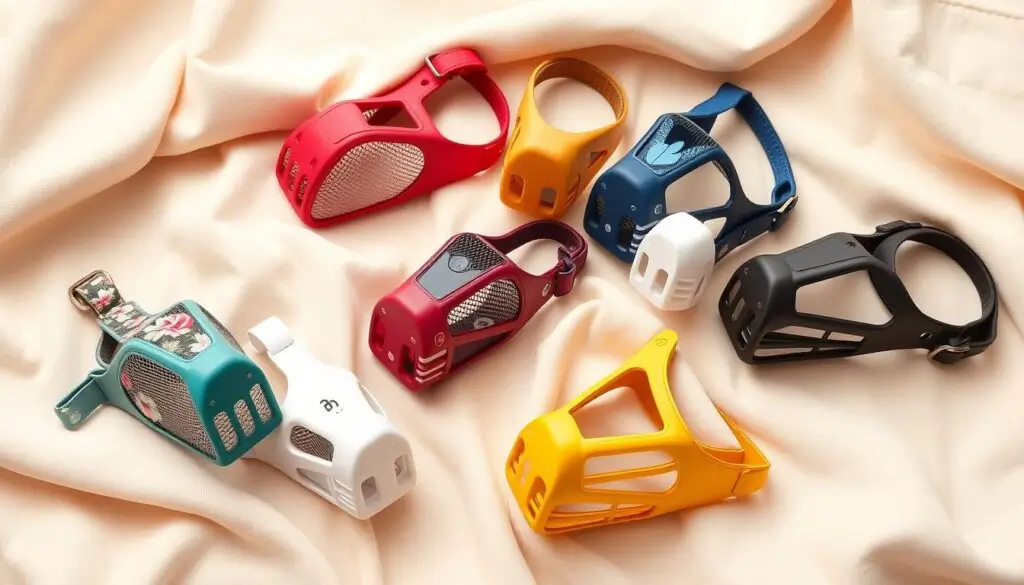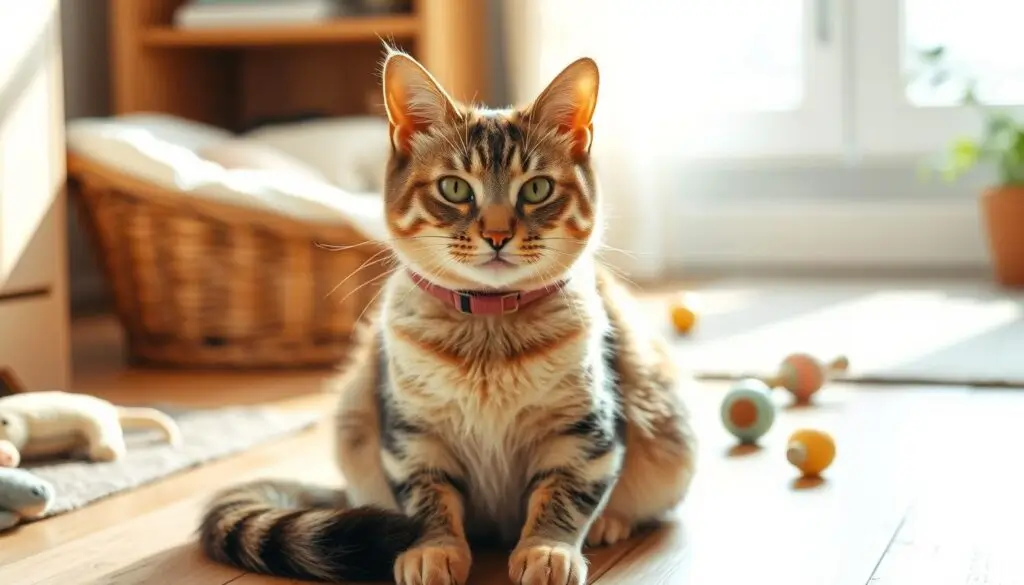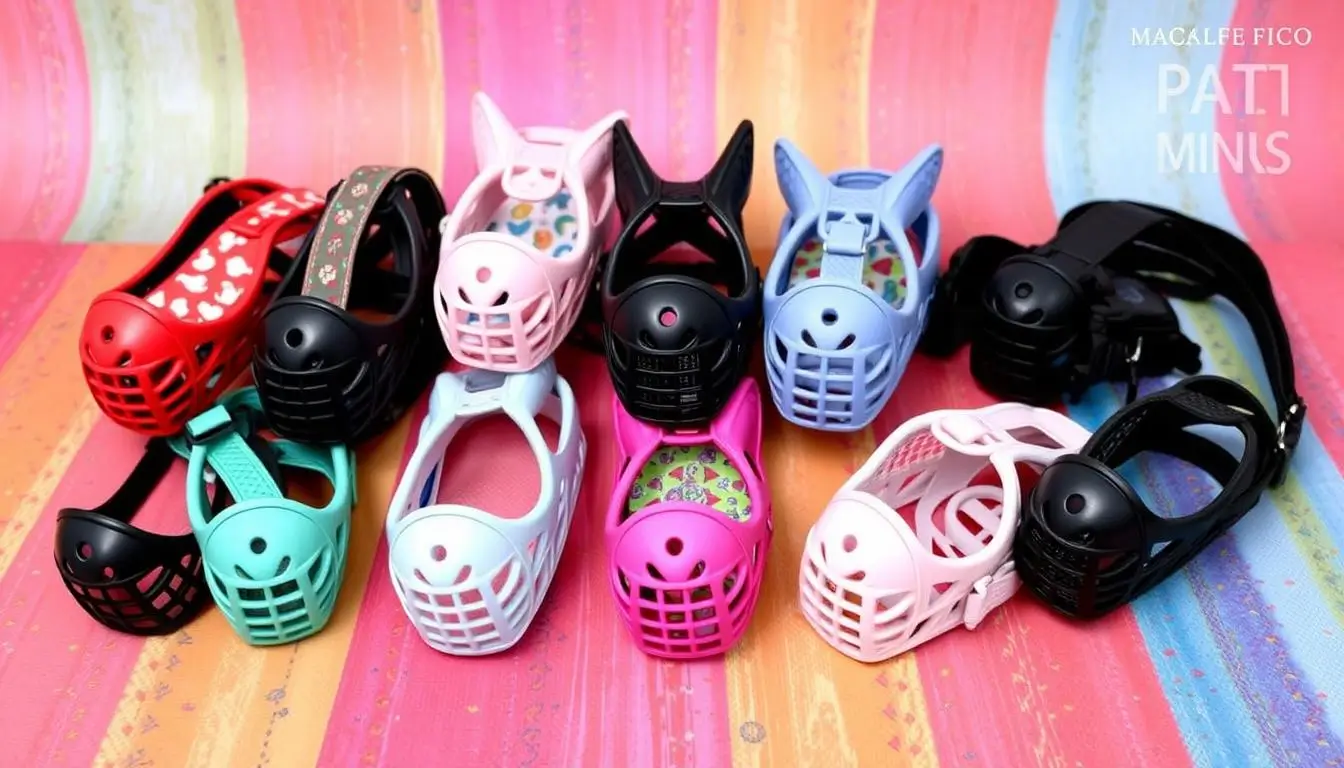Cat Muzzle: Choose the Right One for Your Feline Friend
As a devoted cat parent, the idea of muzzling your cat can be scary. But sometimes, it’s necessary to keep you and your pet safe. Cat muzzles cover your cat’s head and face to stop biting and scratching in stressful times, like vet visits or grooming.
There are many materials, sizes, and styles of cat muzzles out there. It might seem overwhelming to find the right one. But don’t worry, this guide will help you find the perfect muzzle for your cat.
Table of Contents
Key Takeaways
- Cat muzzles come in various materials, including fabric, mesh, and plastic, each serving different purposes based on durability and comfort.
- Proper fit is crucial for the safety and functionality of a cat muzzle, as cats may not be entirely comfortable wearing them.
- Muzzles can help prevent injuries to handlers during vet visits or grooming, as cats may naturally scratch or claw when frightened.
- Slowly introducing the muzzle and positive reinforcement training can help your cat become more accustomed to wearing it.
- Always use muzzles under the guidance of a veterinarian or professional groomer, and avoid prolonged wear to ensure your cat’s comfort and well-being.
Understanding Cat Muzzles and Their Purpose
Cat muzzles are key to keeping our cats safe and happy. They stop cats from biting or scratching in tough times, like vet visits or grooming. They also help when a cat is healing from surgery or an injury, keeping them from harming themselves.
Different Types of Restraint Methods
There are many ways to restrain a cat. Some common muzzles include:
- Fabric Muzzles: These are comfy and let air in, made from materials like nylon or mesh.
- Mesh Muzzles: They let your cat breathe and see better, while still keeping them from biting.
- Plastic Muzzles: These are sturdy but might not be as comfy for a long time.
When Muzzling is Necessary
There are many times when you might need to muzzle a cat, such as:
- Vet visits, when cats might get scared or upset
- Grooming, to stop them from scratching or biting
- Behavioral training, to manage bad habits
- After surgery, to keep them from licking or scratching the wound
Safety Considerations for Your Cat
It’s important to make sure your cat is safe and comfy when wearing a muzzle. They need to fit right and breathe well. Muzzles should only be used for a short time and watched closely to avoid any harm.
Knowing how and when to use cat muzzles helps keep our pets safe and happy in tough situations.
Benefits and Applications of Cat Muzzles
Cat muzzles are more than just a tool for vets. They are also great for grooming and keeping cats safe. These accessories offer many benefits, beyond just protecting handlers.
One big plus of cat muzzles is they help reduce stress and anxiety. Cats can get upset or even aggressive in new situations. A muzzle limits what they can see, making things calmer and more controlled.
Muzzles are especially helpful for cats with behavior problems or those healing from injuries or surgery. They stop cats from licking or biting, which helps wounds heal faster. They also help keep cats quiet, making a more peaceful home for everyone.
| Benefit | Application |
|---|---|
| Protects handlers from potential injuries | Veterinary procedures, grooming sessions |
| Reduces stress and anxiety in cats | Medical procedures, grooming, recovery periods |
| Prevents licking or biting of wounds/surgical sites | Post-operative care, injury recovery |
| Limits excessive vocalization | Calming anxious or attention-seeking behavior |
Whether you work in vet care, groom cats, or just own one, knowing about cat muzzles is key. It ensures the safety and happiness of both you and your cat.
Essential Features of Quality Cat Muzzles
Choosing the right cat muzzle is key to your cat’s happiness. Look for ones made from materials that are both durable and light. These should let your cat breathe well and stay cool. The fit should be snug but not too tight, so your cat can move freely.
Material Selection Guide
Quality cat muzzles are often made from:
- Mesh – It’s light and lets air in, keeping your cat cool.
- Fabric – Soft fabrics like cotton or nylon are gentle on your cat’s skin.
- Neoprene – It’s tough but bends to fit your cat’s face well.
Size and Fit Requirements
Finding the right size is important for a good fit. The muzzle should fit snugly but not too tight. This ensures your cat can breathe and move without discomfort. Adjustable straps and soft padding help get the fit just right.
Ventilation and Comfort Factors
Good airflow is vital to keep your cat cool and comfortable. Some muzzles have extra air panels or mesh for better breathability. Also, look for ones with soft padding to reduce irritation and make wearing more pleasant for your cat.
By choosing a muzzle with the right materials, fit, and ventilation, you ensure your cat’s comfort and safety. This way, you meet their needs while keeping them happy and healthy.
Types of Cat Muzzles Available
When it comes to cat muzzle designs and cat restraint options, pet owners have many choices. There are fabric muzzles for short-term use and mesh versions for better air flow. These options suit different cat personalities and needs.
For cats that are more aggressive, plastic muzzles are a good choice. There are designs like the ‘cat muzzle ball’ or ‘bubble’. These cover the face in a mesh, offering full protection. The ‘cat globe muzzle’ is another unique option, providing similar coverage.
Some muzzles cover both the mouth and eyes, making a ‘cat muzzle mask’. Others just stop biting. The right choice depends on the situation and your cat’s behavior.
| Muzzle Type | Key Features | Ideal For |
|---|---|---|
| Fabric Muzzles | Lightweight, breathable, and comfortable | Short-term use, mild-tempered cats |
| Mesh Muzzles | Improved air circulation, see-through design | Cats requiring better ventilation |
| Plastic Muzzles | Sturdy, durable, and secure | Aggressive or high-energy cats |
| Cat Muzzle Ball/Bubble | Fully encases the face in mesh, 360-degree protection | Cats that require maximum restraint |
| Cat Globe Muzzle | Spherical design for comprehensive coverage | Cats prone to aggressive behavior |
Choosing the right cat muzzle is key. It should meet your cat’s needs while keeping them comfortable and safe. The right muzzle can help manage tough situations and ensure a good experience for you and your cat.

How to Properly Measure Your Cat for a Muzzle
Choosing the right muzzle size is key for your cat’s comfort and safety. To get a good fit, you need to measure your cat’s head carefully. Follow these steps to find the perfect muzzle for your cat.
Head Measurement Techniques
First, measure the width of your cat’s muzzle. Use a flexible measuring tape and place it just below their eyes. Wrap it around the widest part of the muzzle. Record this measurement.
Then, measure the circumference of your cat’s head. Wrap the measuring tape around the largest part of their head, just above the ears. This gives you the crucial head circumference measurement.
Adjusting for Comfort
When picking a muzzle, look for one that lets your cat open their mouth slightly and breathe easily. Avoid muzzles that are too tight, as they can cause distress. Also, avoid muzzles that are too loose, as they may not work well. Many muzzles have adjustable straps to help you get the perfect fit.
Common Sizing Mistakes to Avoid
- Don’t just rely on your cat’s weight or breed to determine the muzzle size. Cats can have different head shapes and sizes, even within the same breed or weight range.
- Don’t choose a muzzle that is too small. It can restrict breathing and be uncomfortable for your cat.
- Also, avoid muzzles that are too large. They may slip off or not provide the needed restraint.
Remember, a proper fit is crucial for your cat’s safety and well-being when using a muzzle. Take the time to measure accurately and follow the manufacturer’s guidelines. This ensures a comfortable and effective muzzle for your feline friend.
Training Your Cat to Accept a Muzzle
Introducing a muzzle to your cat should be done slowly in a calm place. The goal is to make your cat feel at ease and see the muzzle as a good thing. By following these steps, you can help your cat accept the muzzle easily.
- Let your cat explore the muzzle at their own pace. Place it near their food or favorite treats. This lets them sniff and get used to it without feeling forced.
- When your cat seems okay with the muzzle, try putting it on their face for a bit. Give them lots of praise and treats, like tuna juice, Churu, or Catit lickable treats.
- Slowly make the time they wear the muzzle longer. Always end on a good note. Being consistent and patient is crucial.
- Use a clicker to mark when your cat accepts the muzzle. This helps them connect the muzzle with good things.
Never force the muzzle on your cat or use it as punishment. This will make them scared and harder to train. Instead, create a calm space where they can learn to wear the muzzle willingly.

Remember, muzzle training takes time and patience. With steady, positive encouragement, your cat will learn to see the muzzle as part of their routine. This will make medical or grooming tasks easier and less stressful for both of you.
Safety Guidelines for Cat Muzzle Use
Using a cat muzzle requires careful attention to safety. Muzzles should only be used for short times under close watch. This prevents harm to your cat. Always keep an eye on your cat’s mood and actions.
Duration of Wear
Cat muzzles are not meant for long use. They should only be on for tasks like vet visits or grooming. Make sure to give your cat breaks to breathe and relax.
Monitoring Your Cat’s Behavior
- Watch your cat’s body language and actions closely when they wear a muzzle.
- Look for signs of stress, like heavy breathing, agitation, or trying to take off the muzzle.
- If your cat seems upset, take off the muzzle right away and talk to your vet.
Emergency Removal Procedures
Be ready to quickly remove the muzzle in an emergency. Know how to use the muzzle’s quick-release or breakaway features. Have scissors ready, just in case.
Always put your cat’s safety first when using a muzzle. Follow these tips and stay alert to make sure your cat has a good experience.
| Muzzle Safety Considerations | Recommended Practices |
|---|---|
| Duration of Wear | Use muzzles only for the minimum time necessary. Provide frequent breaks for your cat to breathe freely. |
| Monitoring Behavior | Closely observe your cat’s body language and behavior. Remove the muzzle immediately if your cat shows signs of distress. |
| Emergency Removal | Familiarize yourself with the muzzle’s quick-release mechanisms or keep scissors nearby for emergency situations. |
Following these safety tips will help make muzzle use a positive experience for your cat.
Professional Uses in Veterinary and Grooming Settings
Cat muzzles are key in vet and grooming settings for safety. Vets use them during exams and treatments to keep everyone safe. Groomers use them to stop cats from biting or scratching during grooming.
Professional muzzles are made to last and are used a lot in clinics.
Studies show that Low Stress Handling® makes pets more cooperative. This method lowers fear and stress by up to 75%. It’s vital for the safety of both staff and pets.
Groomers trained in Low Stress Handling® work with experts to build a strong bond with pets. This approach helps pets handle grooming better, with an 80% success rate in reducing stress.
The American Kennel Club National Core Professional Dog Grooming Educational Standards highlight safe handling. They include using muzzles correctly during grooming. Following these guidelines keeps pets and groomers safe.
Common Mistakes to Avoid When Using Cat Muzzles
Using a cat muzzle needs careful thought to keep your cat safe and happy. Don’t make mistakes that can hurt your cat’s comfort and health. Avoid using muzzles as punishment or leaving your cat alone while it’s on.
It’s important to make sure the muzzle fits right. It shouldn’t block your cat’s breathing or make it too hot. Clean the muzzle often to keep it clean and prevent skin problems. Never use a muzzle to stop your cat from meowing or making sounds.
- Avoid using muzzles as punishment
- Don’t leave cats unattended while muzzled
- Ensure proper fit to prevent breathing issues or overheating
- Regularly clean and maintain the muzzle
- Never use a muzzle to suppress natural cat behaviors
By following these cat safety tips and using muzzles correctly, you can keep your cat safe and calm. This is especially true during vet visits or grooming. Always put your cat’s needs first and avoid muzzle errors that could harm their health and happiness.
“The welfare of the animal should always be the primary consideration when using a muzzle on a cat.”
Alternative Solutions to Cat Muzzles
While cat muzzles are sometimes needed, there are better ways to help your cat. These methods focus on fixing the root of your cat’s behavior. They aim to make your cat calmer and more at ease.
Behavioral Training Options
Cat behavior modification is a great alternative to muzzles. It uses positive reinforcement to help your cat feel more comfortable. You can teach your cat to handle stressful situations calmly.
Start by slowly introducing your cat to what scares them. Reward them for staying calm. With time and effort, your cat will learn to accept necessary actions without a muzzle.
Natural Calming Methods
Natural calming techniques are another good option. Things like pheromone diffusers or vests can calm your cat. They help your cat feel relaxed in stressful situations.
These methods meet your cat’s emotional needs. They don’t restrict your cat’s behavior like muzzles do.
Professional Assistance
If your cat’s behavior problems don’t get better, get help from a professional cat trainer or vet behaviorist. They can create a plan just for your cat. This might make muzzles unnecessary.
Every cat is different. What works for one might not work for another. By trying different methods and getting expert advice, you can find the best way to keep your cat calm and safe.
Conclusion
Cat muzzles are important for keeping pets safe in stressful times. It’s crucial to pick the right one, introduce it slowly, and use it wisely. This ensures your cat stays comfortable and safe.
Always put your cat’s needs first in cat care. If you’re facing behavioral problems, talk to experts for help.
Keep in mind, muzzles are just a temporary fix. They should be used with positive training to really change behavior. By knowing how to use cat muzzles right, you help your pet stay safe and happy.
Using cat muzzles responsibly, along with good cat care and behavior training, is key. It keeps your pet healthy and happy.
A selection of various cat muzzles displayed on a colorful
